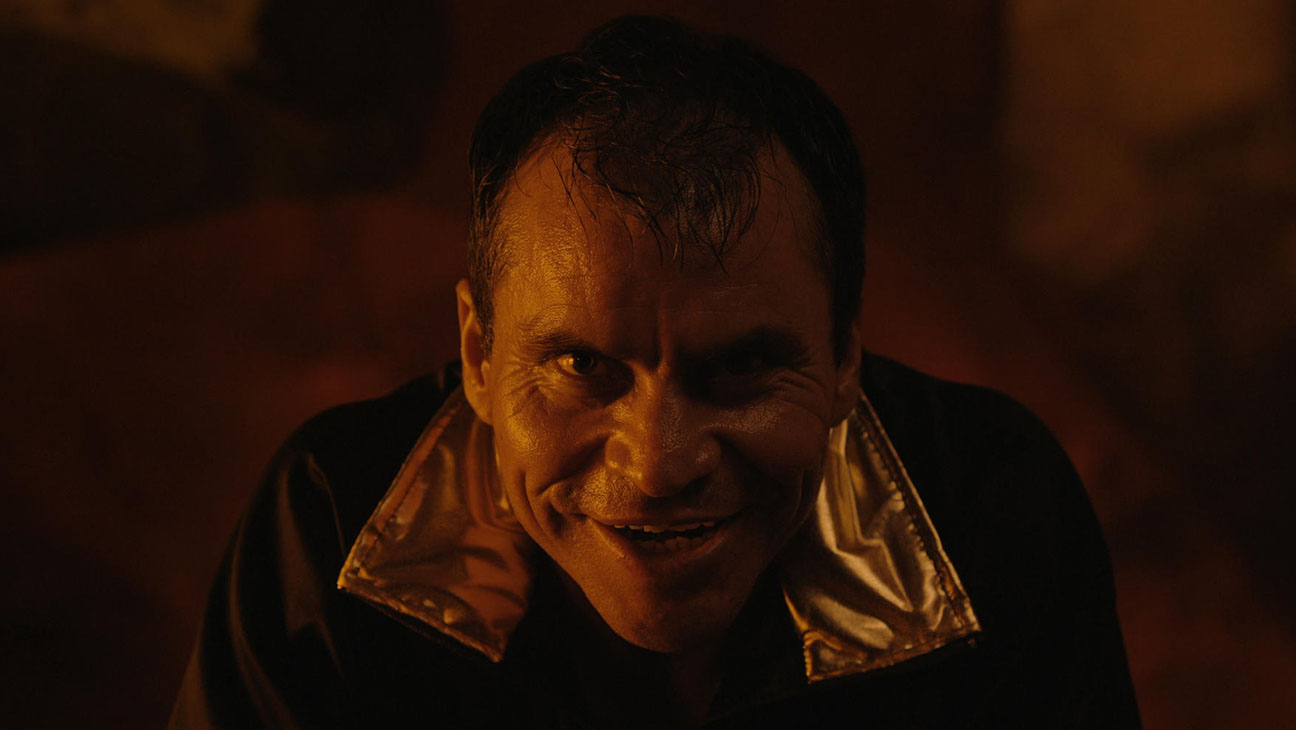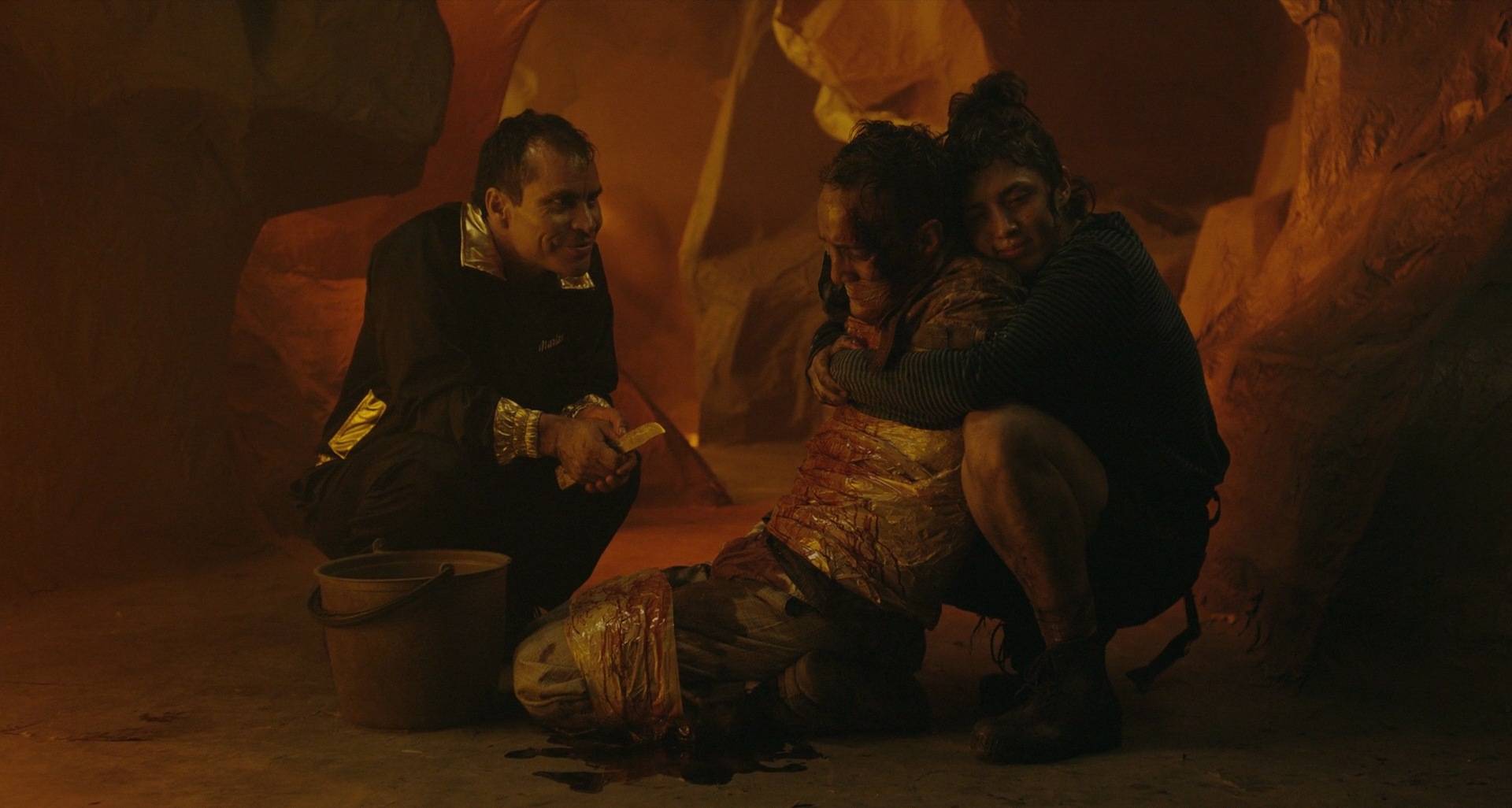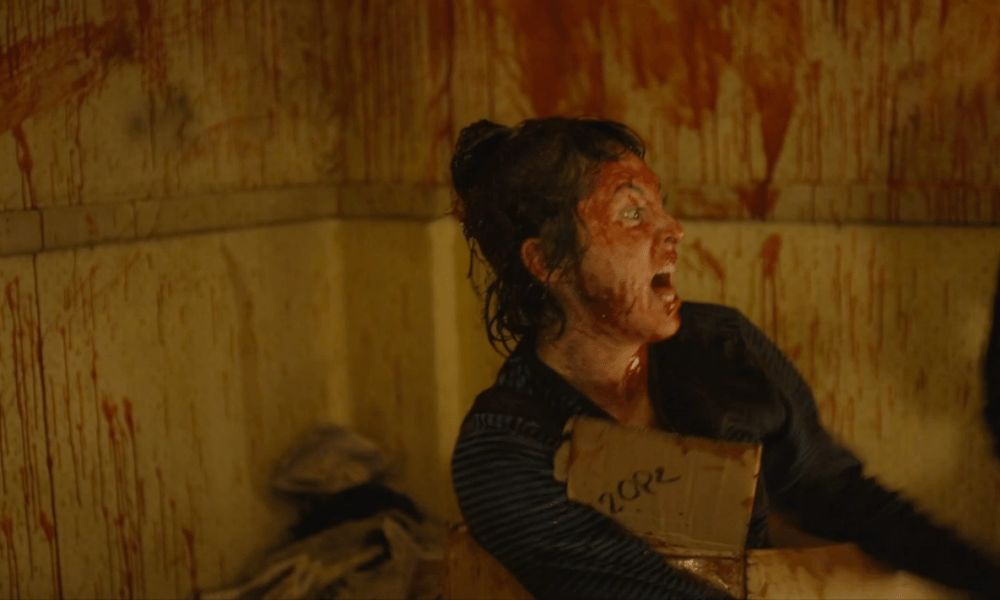ISOYC Issue #2: Chance is the Most Dangerous Criminal in WE ARE THE FLESH



If you’re new to this column, we’d like to offer an introduction of sorts…
Here at The Farsighted, we aspire to highlight independent and experimental filmmakers to provide exposure to works that are often unseen or misunderstood by common movie goers. No genre would best exemplify these two elements better than that of the transgressive film. In this essay series we will be delving into extremity to highlight the artistic merits that are so often missed by those unfamiliar with the sub-genre. For those unfamiliar with transgressive cinema, this will be the perfect introduction as we will explore what brings these titles into the lexicon of cinema. But don’t worry initiated delinquents, those who have already perused French Extremism, consider Salo or The 120 Days Of Sodom a religious experience, or hold your tongue whenever someone asks “What should I watch?”I Spit on Your Cinema looks to not just provide exposure for these often misunderstood films, but to encourage further exploration into the piece’s morbid heart.
Edgar Allen Poe once wrote a story called The Imp of the Perverse in which he imagined the little voice in our head who encourages our worst impulses as an impish demon. That strange feeling; what we know to be wrong and even self- destructive yet still it permeates. A little voice saying “Do it.” No one had quite ever put it in better words until then. Now, with the ventures of cinema into the moral fabrics of the human condition, this imp can not only be named but seen.
Hollywood has never been a stranger to our vices, in many cases it outright exploits it. Drugs, sex and violence. It’s only natural. It offers us release from our carnal selves and joins it with a hero’s journey to create a potent cocktail of fantasy, where all the sex, drugs and violence are justified by redemption or good intentions. The puritanical profit margins dictate the story lines must get dirty, but not so much as to accidentally touch the true nature of it.
The genre of the extreme has never been a stranger to exploring the darkest aspects of human nature. But what strikes a curious chords is often the descension over sexual proclivities commonly featured. Amidst the violence, blood and guts most have no qualm. But to display the human body, to explore the boundaries constantly thrust up around it often strikes audiences with more unease than any serial killing or execution. This has long been the history of film, production codes and counterculture filmmakers who wish to express more unsettling truths about sexuality and the human condition. Its not been the sex that has caused films such as these to be labeled as ‘transgressive’ but it’s honesty that has peered further than most are willing to go.
For those that would seek to truly understand the imp, what better way to do so than to descend and meet him. While most would prefer to banish the thought rather than confront their own prospects for bad or evil, again we see films of the more “extreme” or “transgressive” labels taking on the task of this exploration with an abandon of morality for the sake of understanding.
It’s for this reason that a film such as We Are The Flesh, aside from its technical and artistic prowess, has made its name so common amongst patrons of the extreme and art house. Just as Edgar Allen Poe recognized The Imp Of Perversion within himself, We Are The Flesh seeks unity with its title and to bring understanding that it is not just one person’s deviance, but all of ours. We Are The Flesh.
Released in 2016, the film hit the festival circuit with its debut at Rotterdam Film Festival and was immediately met with acclaim for the debut of Mexican filmmaker Emiliano Rocha Minter. Accompanied by the powerful performances of Noe Hernandez, Maria Evoli and Diego Gamaliel the We Are The Flesh is a mesmerizing stare into the depths of depravity within ourselves.
Written and directed by Minter, the film offers a very brutal examination of the self beyond classic morals. Guided by a guru of perversion Mariano (Noe Hernandez), We Are The Flesh offers a poetic journey of what it means to truly explore the carnal soul. Whether it be heaven or hell would be dependent on the accuser. Just as Mariano sets out to build his own heaven, Minter creates his as well with a stunning display of warm tones, hypnotic slow tracks and mirage after mirage of Jodorowsky level hallucinations. At many points, one can actually smell the sweat of the film as it descends further and further into its own madness.

The film starts off with the introduction of Mariano. Hunched over and covered in filth, he walks through the alley with a mattress on his back. Like Jesus with his cross he carries until he can walk no more and lays it down in an abandoned warehouse. Noticing a collection of bread and a canister of gasoline, he quickly gets to work with a cobbled distillery to make what he calls “The Gas.” A substance not just of intoxication but spiritual ecstasy. Carried in his pocket, Mariano takes to using a dropper to dose himself and maintain a consistent state of being with “The Gas” and sees a vision of heaven.
One day, in search of shelter Fauna (Maria Evoli) and Lucio (Diego Gamaliel), stumble across the abandoned factory. Thinking it to be simple alcohol, they enjoy various canisters of “The Gas” left around and celebrate their good luck. They spend the night and are greeted in the morning by Mariano who stands over their bed and informs them they are in his home. Fauna explains they are homeless, hungry and would be willing to work something out if they could stay. The twisted smile of Mariano is all you need to understand the implications of what awaits.
Mariano allows the two to stay but says they must assist him in his work duties. He has taken to strapping scraps of wood and cardboard together with what duct tape he can find. Along with the uniforms he provides, he also insists there is only one thing to drink. “The Gas.” Fauna and Lucio manage with the conditions, but Lucio confesses he does not like it here. Especially with the lock kept on their door during night so that Mariano can roam free. Fauna insists however there is no other place for them to go.

As the days unfold, Mariano pries into’s relationship. Lucio stands outside a locked door while Fauna offers the exchange of sex for shelter. Mariano taunts and asks Lucio if he’s ever gotten with Fauna. Lucio says “No, she is my sister.” Again the strange man smiles and begins a revelation of the perverse. “So what?” He says and continues into the Freudian exploration of one’s attempt to fight off thoughts of fucking their mother. “I don’t fight her.” He says “I embrace the madness.”
Lucio’s anger boils over and he lashes out at Fauna calling her a whore. Fauna simply shrugs only to upset Lucio further. Fauna’s relationship with Mariano has become more than a transaction, he has become a teacher. During their work they often communicate in a secret language to further taunt Lucio, who remains angered but cowers behind his labor. When Fauna and Mariano are alone he tells her of the beauty in madness, that one should be impulsive, that there should be no barriers for pleasure. Drip by drip “The Gas” and his words fall into Fauna, further intoxicating her.
Late one night, Fauna makes an advance on Lucio to exercise her newfound freedom. Lucio repulses and fights her off. But when Mariano catches him masturbating shortly after he knows he has gained a new pupil. Mariano tells Lucio he should not hide his feelings, there is no wrong in what love does and what we do for love. He tells Lucio that they are a family. Lucio storms off confronted not just by Mariano but his own desire.
At breakfast the next morning, knowing Lucio is vegan, Mariano serves eggs and poisons Fauna. In front of Lucio she begins to choke and vomit on Mariano’s homemade poison. Mariano will save her but only if Lucio eats the egg. Lucio obliges and Mariano revives Fauna. “Now take her.” He tells Lucio. Fauna’s eyes flutter awake and she smiles upon the request.
Incest is a biological law, the body has a natural instinct through years of evolution to avoid it due to malformed offspring. This becomes a very crucial element of Mariano’s manipulations. If he could get Lucio and break a simple moral code such as veganism, the betrayal of a natural law means there may be none otherwise Lucio would not risk, confirming Mariano’s teachings and grasp on Lucio as he forgoes his sense of self righteousness.

As the characters become more carnal we begin to recognize a familiar stranger. That part of us that over the period of hundreds of thousands of years exists still deep within. It’s no coincidence that Minter borrows religious iconography throughout as Mariano becomes a prophetic figure to Fauna and Lucio.
The coming of Christ was regarded as a revelation of morality to human kind, to which Mariano is in direct blasphemy in his imitations of his own parable. Mariano represents freedom not in cleansing the sin but indulging it. His celebration of the flesh combines the body and soul, not separates it. And his heaven is that which some would call hell.
Consecrating the now completed temple in the cave, Lucio and Fauna entwine in carnal indulgence while Mariano masturbates and professes the profane. His heaven come to earth by his hand and words. Mariano’s manipulations and revelations become more than thoughts but gospel.
Just as he pushes Lucio and Fauna into their own depravity, he further escalates his own. Yet, in his pocket he holds a picture where the seed of his own desires becomes apparent. His dead daughter. No matter how hard he reaches into his macabre delights, nothing could ever satisfy like the visions of his daughter smiling and dancing in her innocence brought by “The Gas.”

Lucio and Fauna are not just play things. His manipulations are those of a demented father, a delicate balance of punishment and love. As Lucio and Fauna fall under his spell they become imitations of his desires. Smearing themselves in grime, crawling on all fours and communicating in bestial moans; their carnal natures unearthed by Mariano and his teachings. He tells them off his true desires, how he bemoans birth and wishes nothing more than to crawl back into his mother’s womb. That life has just been a terrible curse. That the spirit and the flesh are the same in their delights and suffering.
The conversations of sex and death throughout become very compelling underpinnings for Minters philosophies to seep through. In captivating soliloquies, Mariano expresses anti-natalism, nihilism and isolation as cures for the human experience in the midst of his carnage. It’s here under the blood,sweat and stains that the film offers a perspective of moral relativism and desire.
This vision quest of incest, violence and madness asks not to justify but only to understand its own introspections. Mariano’s experimentation with impulse poses an interesting question with the revealed death of his daughter as to whether his thoughts are trauma born or if they have always been his nature. While Mariano’s teachings would have one believe it to be confession of nature, there is a clear relationship of sex and death at balance throughout. Nothing, no matter how depraved, could fill the hole in his heart from losing his daughter. Mariano’s actions are revealed to be escapism, not revelation.
Mariano’s teachings stem from a place beyond pleasure but pain. A feeling more universal than love. Without the death of his daughter, who knows what could have come of Mariano. Perhaps he continued on, to live a happy and normal life. But the story of what he did become sheds light on how it is one could become such a thing. Why it is one could simply let go and pursue the freedom of the beast over the stoicism of man. And how so convinced one could become of their own madness that they would inflict it on others.
Continuing in his escalations, Mariano’s desire goes as far as to call for blood. Together with his accolades they kidnap a soldier and threaten to slit his throat. In doing so, Lucio gets shot and leaves Fauna mourning as she drags his body back to their cave. Its hand built walls echo with pain. Mariano tells the soldier he wants to see death and that with his blood, he can bring Lucio back from the dead. Fauna holds the soldier still and together they sing a Mexican anthem to soothe the soldier on his journey into the void. Mariano tells the soldier to close his eyes and slits his throat.

With the soldiers blood a new mixture of “The Gas” is brewed. To demonstrate its power, Mariano injects Lucio with it and brings him back from the dead. Mariano feels he is nearing divinity. He dances in his halls of the profane and communicates with the dark mistress he calls his truth. Until one day, Fauna and Lucio wake up to find him dead of overdose.
Fauna is shattered and spends the days mourning the loss of Mariano. Not even Lucio can comfort her, which revives some former tension. He asks if they can leave but Fauna says no. She’s even taking to satisfying herself with Mariano’s corpse. Caught up in their unearthed desires, they are left to their own devices without a guide.
While Lucio’s guilt begins to come back into frame, Fauna takes to setting out on her own with the abduction and rape of a woman. Lured by Fauna’s beckoning, Lucio’s guilt recedes and he returns to indulgence with Fauna and their new victim. The pleasures echo in the chamber, the climax of Mariano’s teachings come to fruition and shake the earth. So much so that a mighty storm brews and thunders to usher Mariano’s rebirth.
Lucio and Fauna stand in wonder as he appears younger and from a vaginal canal in the wall. Resurrected, Mariano returns to them and says that for his birthday he wants to do something special. That they should fill the halls of their temple and all who are invited should eat his flesh. To which, Lucio and Fauna agree with enthusiasm.

The orgy of blood and sex that follows with a last supper of Mariano’s cannibalising becomes a harrowing delusion as the walls sweat and bodies melt into one another with viscious smears. We lose sight of Fauna and Lucio, become one with the mounting pile of souls that slip and slide over one another through the cave. Moans echo into a shared choir of pain and pleasure. It’s not until the last breath that it ends. Death, the final climax. The door opens and a surviving partier rises to step over the carnage and find the exit door that returns him to the bustling streets of downtown Mexico City.
The thought sets in, that just around the corner past that busy intersection, mixed into the crowds of thousands of faces, right under society’s nose such a place could exist. Mariano’s heaven, the freedoms of depravity so avoided and glossed over with every effort of modern existence. This last image makes for a very defining piece in the deciphering of Minter’s meditations.
Just as Mariano’s heaven exists in the shadowed crease of a societal fabric, it also expresses a macro-cosm of our own psyche. That somewhere beneath our daily commutes, our bank accounts and home lives, he will always be there. Calling for us to join him, to leave it all behind.
Informed by Minter’s philosophies, the character of Mariano creates a compelling examination of the human condition without any compromise. The reward for such a journey is the absolute honesty of the piece. Hernandez’s portrayal of the wild and depraved Mariano is one of absolutely captivating madness and poetry. Throughout, Mariano’s words begin to echo with more and more truth. So much so that not just him but those around him are compelled. For us as viewers, a very intense journey of introspection as we question whether or not we are in agreement with what’s happening on screen.
Utilizing the famed “allegory of the cave”. Minter’s single-location becomes a living and breathing piece of the film. As the characters transform, so too does the setting. What starts as cold and gray industrial walls becomes vibrant hues of warmth. The frame is filled with a vibrant glow that pulls you in. Minter’s use of color throughout reinforces a very embryonic feel that becomes clear with Mariano’s revelations. It’s a strange place of comfort that pulls you further into the betraying questions of depravity that follow.
The characters of Lucio and Fauna offer the most clinical look at carnal desire in their distinct metamorphosis that gives their own insights. Fauna’s sexual agency throughout strikes a particular chord with Lucio, which takes a curious look at the known tensions of brother and sister. Lucio’s disgust with Fauna’s agency is revealed to be insecurity over a desire to possess her himself. Even when Fauna takes it upon herself to engage, he resists because it’s not of his accord. A ripe moment of inspection to the relations of power in sexual politics.
Just as another film similarly concerned with pain and pleasure once boldly declared in the 80’s “Heaven to some. Hell to others.” (Hellraiser). Minter’s modern reiteration of this message strikes with even more captivation as it dares to explore further into our carnal relations to sex, death and desire. What happens when the walls of social mores crumble, when one stands alone and allows the madness to become sanity. As Mariano states at one point, isolation is a gift. It makes it harder to fight the thoughts and instead we must confront them. This could very well be pointed out as the mission statement of this film.
We Are The Flesh offers what could be best described as a meditation on depravity. It’s willingness to stare deep into the shadow self and acknowledge its presence is a transaction of great care and an unwavering frame. Emiliano Rocha Minter crafts a fantastical visionquest of debauchery to provide a further example of what artistry and philosophy can be possessed by the ‘extreme’ and ‘transgressive.’ Beautiful in its poetic expressions and feverish visuals, We Are The Flesh is an easy film to lose oneself to. Hernandez’s impish performance as Mariano harkens to your own little impulse, wherever it may be, and beckons it to come play. For those who have never seen their shadow, he will draw it out.
While the film is only six years outside its release, We Are The Flesh is already a staple of continuing legacy in transgressive films within our modern landscape of cinema. As media censorship becomes more and more commonplace, it appears more challenging for genres of the extreme to find their home. So often discussions on extreme film genres seem rooted to the past and legacy films such as Salo: 120 Days of Sodom, Cannibal Holocaust, John Water’s Pink Flamingos and other important establishing figures of the art house and extreme. It often appears as if there are cornerstones from a lost era of free-wheeling and spirited filmmakers.

But this is not so. With filmmakers like Emilano Rocha Minter out there, it’s assured that just as we can never leave our shadows, the genre of extremity will never leave us. I Spit On Your Cinema aims to not just establish an exploration of the genre and its artistic merits but to highlight the continuing feats of modern filmmakers working to bring extremity, honesty and absolute craftsmanship to your cinematic discourse. That for every statement of “They just don’t make them like they used to.” we can turn around and say “Actually, they do and they’re better.” It’s with this pleasure that I hope you enjoyed this examination of We Are The Flesh and if you have been a stranger to the film until this point, hopefully the water feels warm enough now to jump on in. Indulge yourself, take the journey and truly lose yourself to the beautiful madness of Emiliano Roch Minter and his hellscape.


